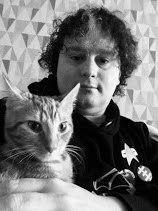Track of the Week: The Fall: Disney's Dream Debased (1984)
Such was the disillusionment of Mark E Smith, lead singer of The Fall, the world's greatest pop group, by 1983. Six albums of brilliant mutant shambling krautrock-rockabilly down the line, not enough people were paying attention. But, fortunately for us, the group didn't quit. On an American tour, Smith picked up new band member and wife Brix Smith, supplier of big American guitars and poppy hooks. None of which really surfaced on the next Fall album, the excellent 'Perverted By Language'. But, thanks to Brix's input, by 1984's 'The Wonderful and Frightening World Of The Fall' and its attendant singles, Britain's strangest group was planning something of a full-scale assault on the mainstream. Running through pagan chants, paranoid occult hysteria ('The Fantastic is in league against me!'), murder and the like, lyrically Mark is on top form, but the rough, discordant, epic repetition of, say, 'Hex Enduction Hour' (not a criticism) is replaced with strongly defined, if eccentric, song structure. Producer John Leckie (he of Pink Floyd and later Stone Roses fame and with a degree in handling 'difficult' musicians and frontmen) cleans up the sound, replacing the murk of former releases with a clean, crisp sound and bringing Smith's vocals to the fore.
'Disney's Dream Debased' closes the album. It's subject matter is typical Fall fare - something goes horribly wrong at Disneyworld - 'Blood on the ground /Blood on the sand, blood all around.' Although left ambiguous in the song, it was inspired by Mark and Brix Smith's real-life visit to Disneyworld in California, where a woman was accidently decapitated by a ride. But rather then focus on the inherent horror of the event, as we might expect him to do, Mark E Smith turns it into a meditation on the inevitable loss of innocence - 'The dream, an innocent meets her fate'. Disney's child-like dreams are no match for the grim violence of the modern world, in the same way that everyone's childish innocence simply cannot survive the reality of adult life. The music is equally unexpected from The Fall - all sunny, jangly guitars - more or less in tune for the first time in their career - offset by the vaguely discordant droning of the lead guitar, giving the song a sinister edge. The song is driven, as always, by Steve Hanley's dynamic bass playing, which gives the song a powerful momentum, despite being interupted half way though the second verse, leaving the guitar by itself to pick out a mournful twisted fairground tune before launching back into the verse again. Brix sings 'Diiisneeey' in harmony plaintively in the background, whilst Mark's usual violent ranting is exchanged for a more reflective tone. Pop music, but entirely on the band's own terms. The overall effect is moving, yet haunting, with Smith claiming the song was birthed 'In fallen dreams / Anthem to /Creator of all that had stopped'. The song certainly has a weird, elegiac feel - haunted by the ghosts it is dedicated to. Which is typical of Mark E Smith's gritty social surrealism - ordinary events are twisted into bizzare grotesque caricatures of reality to highlight the ills of modern society. The Fall - Wonderful, Frightening, and so much more.

